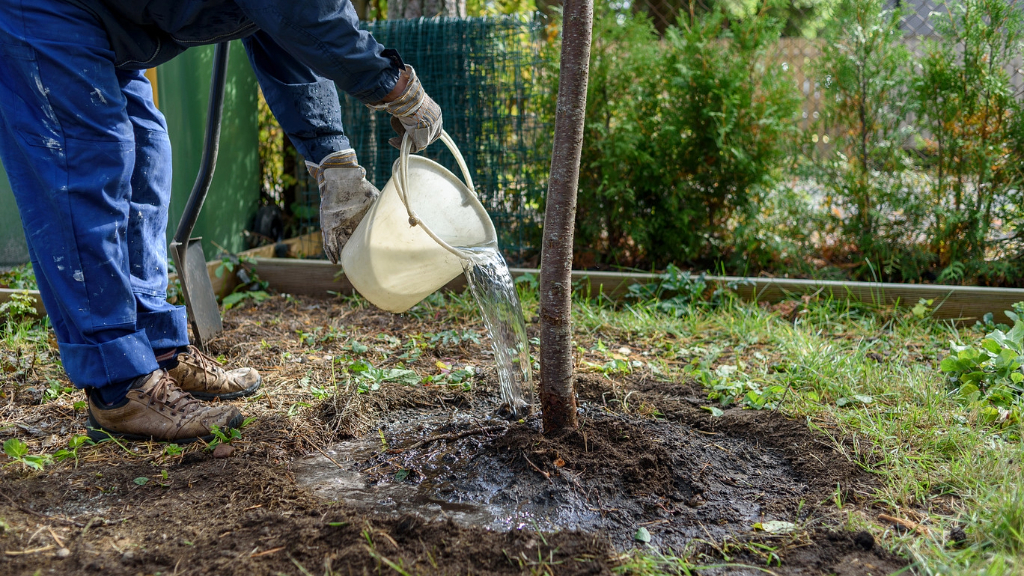Learn About Pros And Cons Of Planting Trees


You may decide to plant a tree in order to beautify your backyard, provide shade in the hot summer, or create a privacy curtain to shield your garden from curious eyes. But the actual benefits - or detriments - extend well into the future. Tree planting advantages are obvious, but unless you are careful about tree selection and maintenance, you may also experience serious downsides. Read on for a full discussion of tree planting pros and cons.
Pros - Trees Planting Advantages
(Teo's viewpoint) If you ever search for reasons to plant a tree, just take a drive around the neighborhood. Look up and down the avenues and note how tree-lined streets just feel safer, happier and healthier than those with only cement sidewalks and parked cars.
They offer unending beauty. One of the primary reasons we plant trees is for their relaxing beauty. They also provide shade in hot summer weather and a connection to nature. The color green reduces stress, and flowering or fruit trees also provide additional eye-candy. But improving the visuals of your yard or neighborhood is only one of many tree planting pros.
Trees help the environment. By planting trees, you also help make the world a better place. Appropriately planted trees can reduce noise pollution by blocking sound waves, reducing noise by up to 40 percent. They reduce air temperature by blocking sunlight and serve as a natural air conditioner as water evaporates from the leaf surfaces, removing heat energy from the air.
They help reduce pollution. Another tree planting advantage is that these woody plants trap dust, pollen and smoke from the air. Pollution is significantly reduced on the sheltered side of a tree. And they also help prevent surface water runoff.
Trees improve air quality. Perhaps the most important advantages of tree planting in these troubled times is how they assist with climate change by reducing the greenhouse effect. Trees absorb harmful gasses from the air, including carbon dioxide, sulfur dioxide and carbon monoxide. In return, they release oxygen (which we need to breathe). The amounts in question are impressive. While every gallon of gas you burn produces some 20 pounds of carbon dioxide, a big, healthy tree can take up and store 13 pounds of carbon every year. That means that an acre of trees gets rid of 2.6 tons of carbon dioxide.
Trees provide shelter. That tree you've planted in the landscape help to provide habitat for many animals, birds and insects - just another reason to add more.
Sign up for the Gardening Know How newsletter today and receive a free copy of our e-book "How to Grow Delicious Tomatoes".
Cons - Problems with Planting Trees
(Mary Ellen's viewpoint) Of course, trees aren't bad; everyone loves these majestic plants. But that doesn't mean there aren't any cons of planting trees in your yard or garden, or that trees are right for every space. There are some very valid reasons that you may want to reconsider putting in that new tree and opting for shrubs or flower beds instead.
Among the downsides of tree planting are costs, effort, maintenance, space limitations, and more. Yes, trees are pretty and offer shade, but they can also be real pain. Here are some very real problems with planting trees you just don't want to have to face:
Trees are expensive. As compared to a compact little shrub or some native perennials, a tree is pricey. Expect to pay up to $200 each as well as any extra costs if you are having a landscaping company put them in. Mature trees are more expensive than little ones.
They'll wreak havoc above and below ground. If you don't have the right space for a tree that will grow from tiny to massive, that tree can cause a lot of damage. Under the ground, its roots can hit and break water lines and pipes, while up in the air the branches need to be trimmed or they may take down power lines.
Trees tend to grow slowly. So you take the time and pay the costly price of putting a tree in the ground and then wait, and wait. You want a big, beautiful tree with mature canopy and shade, but it could be decades before you get it. It's not always worth the effort and time.
Maintenance is a must with trees. Sure, your other plants need to be maintained too, but not on the scale of a tree. Trees must be pruned and trimmed regularly; they drop leaves that you have to deal with every single fall, and trees may also make a big mess in the spring and summer with seeds and fruits that you'll have to clean up.
Definitely avoid fruit trees if you want low maintenance. If you need a low-maintenance yard or garden, whatever you do don't plant fruit trees. These trees are finicky and time-intensive. They require pruning, harvesting, and then cleanup when inevitably you can't keep up with all the fruit. You'll also have to protect it from insects and birds and watch for diseases, which are pretty common in fruit trees.
Do Reasons to Plant Trees Exceed the Cons?
Okay, the cons of planting trees may seem overwhelming when you really think about it. Unless you have unlimited space, money, and labor, avoid putting in new trees and stick with more manageable, cost-effective plants for your garden and yard. That said, the reasons for planting trees range from making your grounds more attractive to reducing the effects of global warming. While planting the wrong tree in the wrong place can result in serious problems, planting the right tree is the right place is always a good idea.

Teo Spengler is a master gardener and a docent at the San Francisco Botanical Garden, where she hosts public tours. She has studied horticulture and written about nature, trees, plants, and gardening for more than two decades, following a career as an attorney and legal writer. Her extended family includes some 30 houseplants and hundreds of outdoor plants, including 250 trees, which are her main passion. Spengler currently splits her life between San Francisco and the French Basque Country, though she was raised in Alaska, giving her experience of gardening in a range of climates.